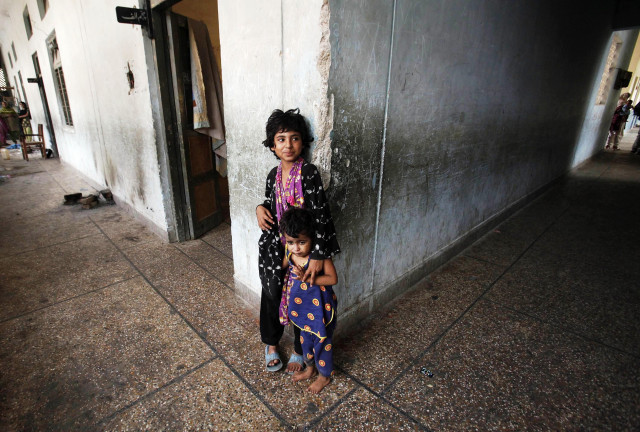Ready or not, here they come
Schools in Sukkur to open on Monday even though the buildings may be just too dirty for classes.

“It is going to be hard enough [as it is] to catch up after the four months of vacations,” said teacher Naeem Akhtar of the District Madrassa Board Girls High School in Sukkur. “Usually, we have the first final examinations in the last week of September but that was impossible this year because of all the IDPs living in the schools.”
Only some of the flood survivors have left, or were gently kicked out of government schools, which were converted into makeshift relief camps to accommodate the thousands of people forced to evacuate their homes because of the flood. Out of the 313 schools across Sukkur district that were turned into relief camps, only 50 have been vacated. Since September 17, for the entire province, 453 schools have been vacated, bringing the total number of schools being used as shelters down to 3,180.
Meanwhile, the schools that have been emptied are in no state to hold classes. Thousands of families camped out in the limited spaces, leaving the buildings in pretty bad shape. The floors are charred black from cooking on wooden stoves, the furniture has been broken or otherwise damaged and in some cases, chopped up to fuel the kitchen fires. Windows have been broken, there has been damage to electricity and sewerage lines.
For their part, the schools say that the education department will have to clean up their buildings. What is expected to take longer is the replacement of school furniture and fixtures, for which requests have been sent.
Sukkur district officer education Muhammad Suleman Qureshi confirmed that the furniture had been broken up by IDPs staying there. “We have written to the EDO health Sukkur and Taluka Municipal Administration Sukkur to fumigate and clean the schools so the students don’t catch any disease,” he said. It may help that many higher secondary schools in Sukkur were run by USAID, he added. A report has been submitted to the UN agency, requesting furniture replacements. But for now, if their state is anything to go by, it is unlikely that classes will begin on time.
Teacher Akhtar sympathised with the displaced people but felt the government had to make some tough choices. “These poor people have lost everything because of the floods and then they were forced to live in relief camps,” she said. “We should not be forcing them out but then the students are suffering too.” The government could move the IDPs from schools to tent cities or send them home.
“Our education is suffering because of the extra two-month vacations,” complained a student. “The IDPs should be sent back home so that the schools can open and we have time to study for our exams.”
The academic year is spread over eight and a half months with two months reserved for summer vacations and a month and a half for other holidays. Completing the syllabus this year seems near impossible. “We will either have to shorten the syllabus or leave out some of the more unimportant chapters in the exams,” said Akhtar.
According to National Disaster Management Authority (NDMA) estimates, approximately 9,700 government schools have been damaged or destroyed across the country because of the flood.
In Sindh, the number of schools damaged is around 9,000.
Published in The Express Tribune, October 3rd, 2010.



















COMMENTS
Comments are moderated and generally will be posted if they are on-topic and not abusive.
For more information, please see our Comments FAQ